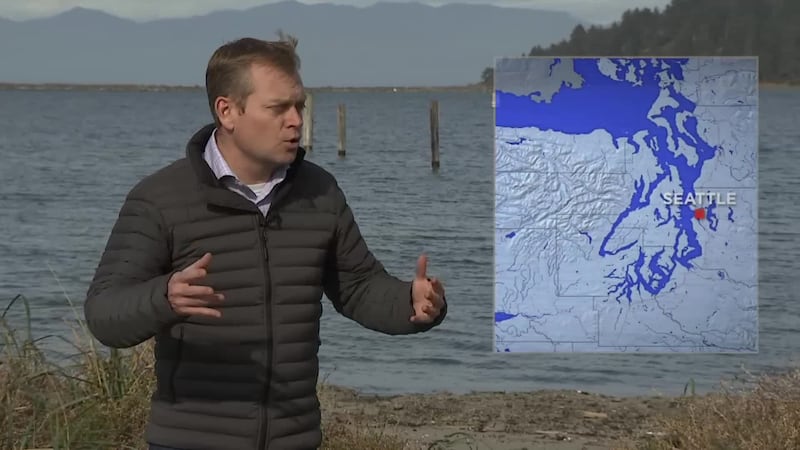In May 1999, the hunt was on and so was the fight.
Off Neah Bay, Makah tribal members harpooned a gray whale as activists from Sea Shepherd tried to disrupt the hunt.
Tensions were so high the National Guard and the Coast Guard were called in.
It was the tribe's first whale hunt in decades, allowed by a treaty with the U.S. government that guaranteed the Makah's right to keep whaling.
"It was like you didn't know something was missing until you felt it," said tribal council member Patrick DePoe, who was in high school when the Makah took the whale.
Years of court fights followed the hunt, and now the Makah are seeking a federal permit to resume whaling.
"We're talking 20 years; an entire generation has not been able to experience what I felt in '99," DePoe said.
"We have been whaling for thousands of years," said Janine Ledford, executive director of the Makah Cultural and Research Center.
The Makah Museum features whale hunting equipment that is centuries old.
A mudslide sometime before 1700 in the village of Ozette preserved evidence of the long tradition.
"We excavated tons of whale bones from Ozette," Ledford said.
Whaling is so important to the Makah, it's in the 1855 Treaty of Neah Bay.
The tribe gave up 300,000 acres of land on the Olympic Peninsula.
But the U.S. government agreed the Makah could keep whaling.
It’s the only tribe in the country with whaling written into its treaty.
"It might not be something that you or your family are familiar with, regarding your history. It is certainly very important and central to our life," Ledford said.
Beginning November 14, an administrative law judge in Seattle will hear arguments in the Makah's long effort to resume the hunt.
Federal regulators are on board. In fact, NOAA Fisheries is proposing the hunt.
NOAA says there as many as 27,000 Eastern North Pacific gray whales.
In the 1920s, the Makah voluntarily stopped whaling when commercial hunting nearly wiped out gray whales.
The whales got federal protection in the 1970s, and recovered enough to be removed from the Endangered Species List in 1994.
NOAA proposes allowing the tribe to take an average of two and a half whales a year.
"There's more than 20,000 of them, it would not be a big deal to take two and a half a year," said NOAA contractor Donna Darm.
Sea Shepherd is among the groups challenging the whaling plan.
"No whales should be killed anywhere in the world at any time for any reason," said Brett Sommermeyer of Sea Shepherd Legal.
Sommermeyer said the tribe doesn't have the only right to whales; there's also a legal right of other U.S. citizens to study and watch them.
Sommermeyer said NOAA has not sufficiently investigated why gray whales are dying on the West Coast this year.
More than 200 have washed ashore, which means many more are suspected to have died and sunk.
A hunt, he says, doesn't make sense, especially at a time whales are washing up dead.
"You're now putting a stressor on a larger population of whales that's already impacted by pollution, climate change, underwater noise, and you're adding one more thing to the mix," Sommermeyer said.
He points to science that shows whales are intelligent, social creatures.
And he says two other groups of whales sometimes intermingle with targets of the hunt.
Western North Pacific gray whales are endangered, and there's a small group of whales that spends summers near the hunting zone.
Sommermeyer is concerned the Makah will get the wrong whale. "You can't tell (the difference)," he said.
"We have our hunting plan set up in a way to avoid these whales," said Patrick DePoe of the Makah tribe.
DePoe said the whales would only be used for tribal members' subsistence.
He acknowledges the Makah have grocery stores, but said, "There's a lot to be said for turning back to your traditional diets."
In 2007, five tribal members illegally killed a whale in the Strait of Juan de Fuca.
In federal court, three pleaded guilty and two more were convicted.
"When you say it was an illegal hunt, the first thing I go back to is our treaty right," DePoe said.
Still, he says nothing like it has happened since.
The tribe is now working with regulators to get a waiver to the Marine Mammal Protection Act for a new hunt up to 40 miles offshore.
NOAA Fisheries will come up with rules for catching the whale with a harpoon and killing it quickly with .50 caliber shot to the head.
"This is being mandated upon us. It isn't something we wanted to do, but they feel it is a more humane way for the animal," DePoe said.
As the Makah hope to return to whaling, Depoe is worried for the safety of his people.
He remembers bomb scares at the school and the senior center, and those tensions at sea.
"We are going to take precautions, whatever those might be," DePoe said. "''99 did open our eyes up to what people are willing to do."
More news from KIRO 7
- Troopers: 3 hurt, 3 arrested after crash on I-5 in Federal Way
- Woman feeds deer on her property; Wildlife officials say ‘This is definitely not OK'
- Police: Man threatening to shoot people outside haunted house causes standoff
- Investigation finds deputy's killing of Snohomish County man ‘unjustified'
- Do you have an investigative story tip? Send us an email at investigate@kiro7.com
Cox Media Group








